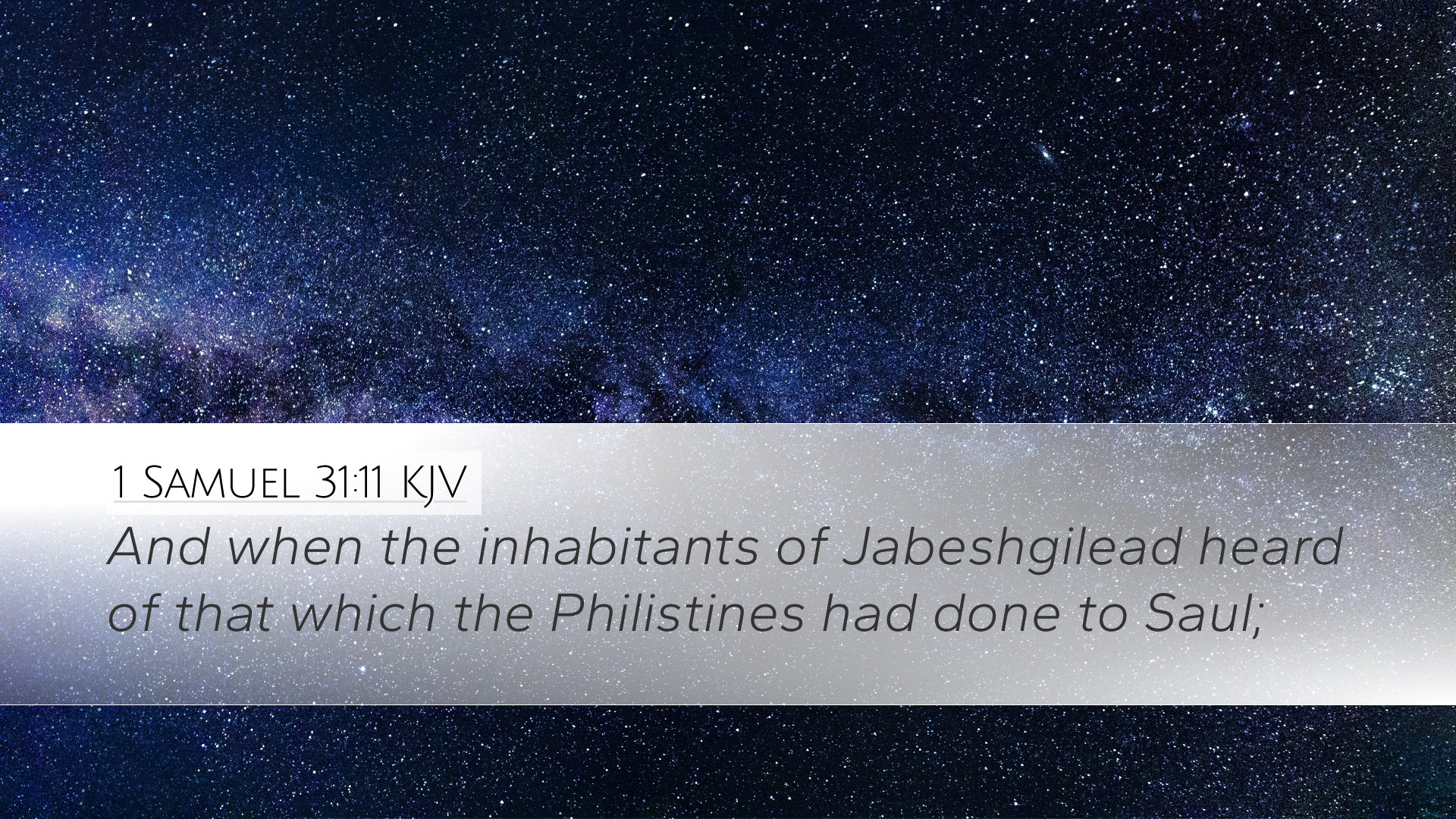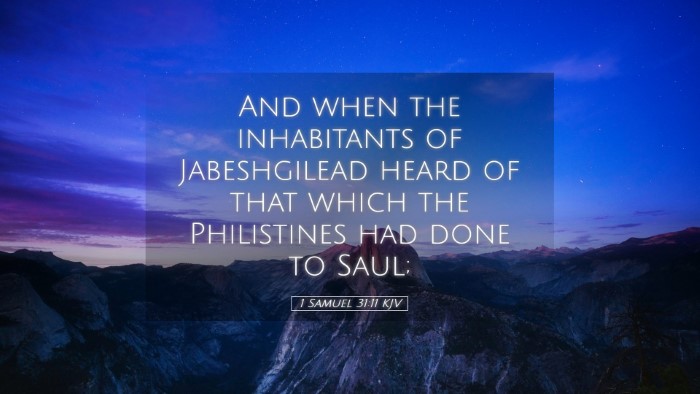Commentary on 1 Samuel 31:11
Verse Reference: 1 Samuel 31:11 - "But when the inhabitants of Jabesh-gilead heard of that which the Philistines had done to Saul,"
Introduction
This verse concludes the narrative concerning the tragic death of King Saul, the first monarch of Israel. The events following his demise underscore the complexities of leadership, the reality of human frailty, and the enduring quest for honor and legacy. The response of the men of Jabesh-gilead to Saul's death is pivotal, as it illuminates themes of loyalty, memory, and communal identity.
Historical Context
The city of Jabesh-gilead held significant historical importance, being the site of Saul's earlier victory when he had rescued its inhabitants from the Ammonite king Nahash (1 Samuel 11). Their loyalty to Saul, displayed after his death, highlights the gratitude and allegiance towards a king who had once delivered them from peril.
Commentary Insights
- Matthew Henry: Henry emphasizes the significance of Jabesh-gilead's response as a reflection of their loyalty. He notes that the men acted not just out of obligation but from genuine respect for Saul’s past leadership. This act of retrieving his body is portrayed as both an honor and an acknowledgment of Saul’s initial kingdom victories.
- Albert Barnes: Barnes adds theological depth, suggesting that Saul's death marked a profound moment in Israel’s history. He contrasts the glory of Saul's earlier reign with the despair of his last moments, reinforcing that even in sorrow, local communities like Jabesh-gilead can act honorably, illustrating the ongoing relationship between God’s people and their leaders.
- Adam Clarke: Clarke notes that the actions of Jabesh-gilead symbolize a broader repudiation of Philistine oppression. He highlights the courage it took for the men to retrieve Saul’s body, considering the danger they faced from the victorious Philistines. This act of bravery serves as a testimony to the extent of their loyalty and to the God-ordained nature of kingship among Israelite leaders.
Literary Considerations
The narrative in 1 Samuel employs poignant contrasts, particularly between Saul’s earlier achievements and his final tragic demise. The inhabitants of Jabesh-gilead serve as a narrative vehicle through which themes of loyalty, memory, and honor are explored. Their actions prompt questions about identity, heritage, and the collective memory of a community.
Symbolism
Saul's body hanging on the wall of Beth-shan symbolizes the ultimate dishonor and defeat. In retrieving it, Jabesh-gilead's men not only seek to restore Saul’s memory but also reinforce their own identity as a people who recognize and uphold righteousness, even amidst overwhelming tragedy.
Theological Implications
This verse encourages believers to consider their responses to tragedy and loss. It prompts them to reflect on the history of faith and the continuity of God's covenant despite human failure. The actions of the Jabesh-gileadites serve as an impetus to uphold the dignity of leaders and understand the weight of legacy in the light of God’s larger narrative.
Lessons for Modern Faith Communities
- Courage and Loyalty: Just as the men of Jabesh-gilead showed commendable loyalty to Saul, modern congregations are called to demonstrate loyalty to their leaders and to each other, especially in difficult times.
- Honor and Remembrance: There is a profound need for communities to remember their past, acknowledging both the successes and the failures of those who came before, and to learn from them.
- Collective Identity: The history of a community shapes its present and future; thereby, fostering a strong sense of communal identity rooted in faith and shared tradition is essential for growth and perseverance.
Conclusion
1 Samuel 31:11 serves as a vital point of reflection for leaders and congregants alike, emphasizing the themes of honor, loyalty, and memory. The actions of the men of Jabesh-gilead encourage modern believers to revisit their collective histories and commitment to outreach, solidarity, and respect for those who have influenced their faith journey.


